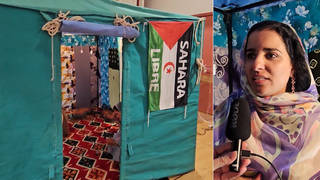In Ivory Coast, a court sentenced 10 nationals of Burkina Faso to one decade in prison for trafficking children and forcing them to work on cocoa plantations. The group trafficked at least 40 children between the ages of 10 and 17 years old. The Ivorian prosecutor said the conviction is part of a shift in how the legal system treats such crimes.
Edgar Damoi: “We want to say that Ivory Coast’s justice system is changing. We are breaking away from impunity for good, because our people need to understand that our children’s place is in school and not in the fields, not in quarries or in gold mines.”
But many international corporations continue to be shielded for their role in child trafficking and slave labor. Last month, the U.S. Supreme Court ruled in favor of Nestlé and Cargill, dismissing a lawsuit because the abuses took place overseas. The case was brought by six men trafficked to the Ivory Coast from Mali as children to work on plantations.











